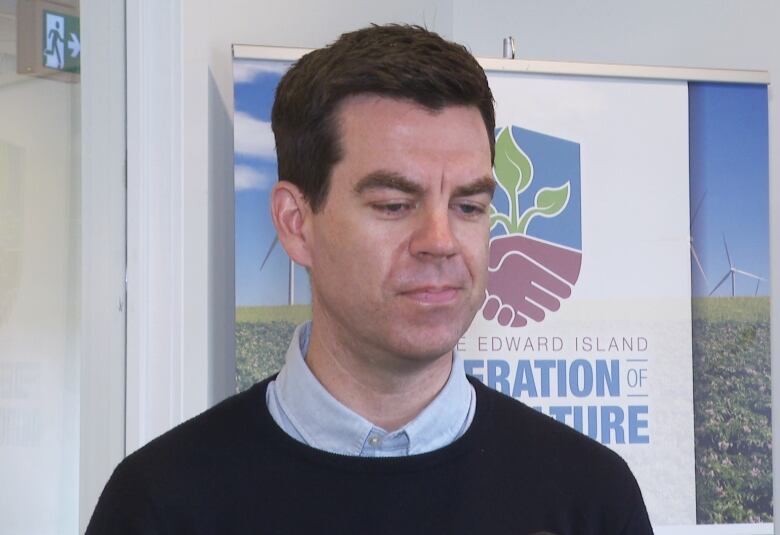Fatigue a factor in P.E.I.'s economic slowdown
‘Industry has been working hard and they’re getting tired’

The cooling of the P.E.I. economy in 2022 is a reflection of the Island's struggles recruiting workers, say representatives of the construction and agriculture industries.
P.E.I. led the provinces in economic growth from 2019 to 2021, but with 2.9 per cent growth in 2022, the province slipped below the national average of 3.6 per cent.
Construction was one of the sectors dragging growth down, with construction GDP actually negative, dropping 3.1 per cent. That followed years of strong growth, even through the pandemic.
For example, 2021 was a record-breaking year for the industry, said Sam Sanderson, general manager of the Construction Association of P.E.I.
"We gradually worked our way up to that 2021 year and then we hit our plateau as an industry," he said.
"Industry has been working hard and they're getting tired, so numbers are down a little bit in 2022. Labour is a big part of it. We need more people to keep building at the pace we did in 2021."
The need for more workers is not limited to construction sites, he said. There are also shortages in the architecture and design stages, and government planning departments are struggling to keep up.

Post-tropical storm Fiona was also a factor. Progress on building slowed in advance of the storm, as contractors pinned down construction sites, and work was slow to start up again through late September and October as many tradespeople were busy repairing their own homes or helping neighbours.
It is also likely that a lot of unrecorded work was done in the wake of the storm, said Sanderson.
"When you have an industry that's in such high demand and a shortage of people, it's amazing the amount of cash jobs," he said.
"[Those] are not contributing to the GDP growth."
Agriculture down
Agriculture also had a big year in 2021, up 15.7 per cent before subsiding last year, ending up down 2.7 per cent.
Grain and oil seeds fetched high prices in 2021, and strong sales were recorded for blueberries, dairy and, of course, potatoes, said Donald Killorn, executive director of the P.E.I. Federation of Agriculture.
He said the results for 2022 shouldn't be too surprising by comparison, marking a slowdown from what "perhaps wasn't a sustainable rate."

But Killorn said there are structural issues holding the industry back, and chief among these is a shortage of labour.
"That's something that has a significant impact on our ability to produce economic growth," he said.
"We need our government to take a co-ordinated approach to making labour more accessible."
About 40 per cent of P.E.I.'s agricultural workers are temporary foreign workers, but ensuring a steady labour supply is about more than just government keeping the path clear for those workers, said Killorn.
The province also needs to fix its housing and primary health care problems, and in that way make P.E.I. a more attractive destination for new residents.
Retail picture mixed
Retail is a big contributor to GDP on Prince Edward Island. In 2022 it represented 7.0 per cent of GDP, about equal to construction's share and more than agriculture's contribution, at 6.3 per cent. So when growth of just 1.4 per cent follows a 9.6 per cent hop in 2021, that makes a difference in overall GDP.

But retail is not a monolith, and that was particularly evident during the pandemic. When many retail sub-sectors were literally closed, groceries buoyed retail as a whole, which ended up growing 0.7 per cent.
In 2022, however, groceries were a drag on the sector. High inflation had people taking more care when shopping for food, and that sub-sector shrank 2.6 per cent.
Clothing and accessories, meanwhile, followed a very different pattern.
The sub-sector was one of those closed entirely in the early months of the pandemic, and it shrank more than 20 per cent in 2020. However, it had the strongest recovery of any retail sub-sector in 2021, up 32 per cent. There was a further growth of 6.2 per cent in 2022.
Philip Tweel, owner of Island Active Wear in Charlottetown, said the results could have been even better if not for post-tropical storm Fiona.
"When you're worried about your house blowing apart, and power and food, the last thing on your mind is going out to buy apparel," he said.

The rebound in tourism also made a big difference to his business in 2022. Tourists like to shop, he said, and in particular they like to seek out independent businesses like his, rather than the retail chains that are available in their hometown.
Still a leader overall
While the P.E.I. economy slowed in 2022, it still showed growth.
Fred Bergman, an economist with the Atlantic Provinces Economic Council, said looking back over the past few years, P.E.I. is still a leader.
"If you compare 2022 GDP to 2019 GDP, P.E.I. had the largest growth — 9.1 per cent — of any province over the last three years, even with a slower pace in 2022," said Bergman.
He described the provincial economy's performance last year as a modest slowdown.
With files from Brian Higgins

